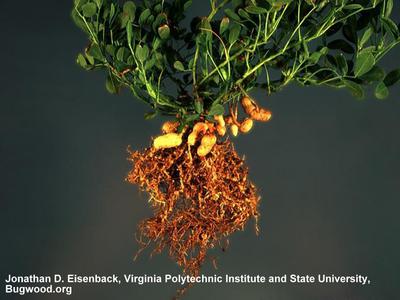Kalahasthi Malady
Bitylenchus brevilineatus
Other
In a Nutshell
- Discolored pods. Stunted growth. Shortened and discolored stalks. Patchy growth of plants, reduction in pod size, brownish brown black discoloration of pod surface.
Can also be found in
Symptoms
The pods are smaller than normal and are brownish-black colored with small lesions. The lesions coalesce and can cover about three-quarters of the surface. Pod stalks are also discolored and shortened. Affected plants appear stunted and have greener than normal leaves. Small brown yellow lesions appear first on pegs and pod stalks and on developing pods. Pod stalks are reduced. Later pod surface becomes completely discoloured. Infested plants appear in patches. They are stunted and have greener foliage than normal.
Recommendations

Organic Control
To this day we are not aware of any biological control method available against this pest. If you know of any successful method to reduce the incidence or the gravity of the symptoms, please contact us.

Chemical Control
Always consider an integrated approach with preventive measures together with biological treatments if available. The population of Tylenchorhynchus brevilineatus can be reduced by applying carbofuran 3G (4 kg/ha)on your soil.
What caused it?
The casual agent for this disease is the nematode, Tylenchorhynchus brevilineatus. The disease is most severe in sandy soils. Crop yields can be severely affected by the disease.
Preventive Measures
- Plant tolerant varieties, like Kadiri-3, Tirupati 2 and Tirupati 3 (Prasunna), if available.
- Apply green manure and incorporate organic manure to the soil.
- Plow the soil down to a minimum depth of 20 cm in the hot summer months.
- Exposing the soil to the sun will kill the nematodes.
- This practice can be coupled with summer fallow to make it more effective.
- Consider rotating with rice or other cereal crops like sorghum and maize on your field.
- Quarantine regulations need to be strictly monitored to check the entry of Aphelenchoides arachidis and Belonolaimuslongicaudatus.



